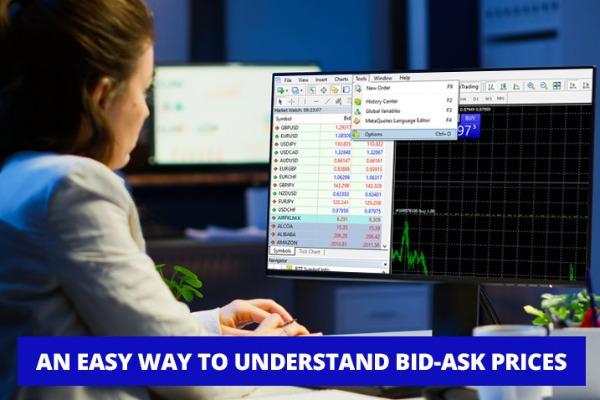Entering the forex market with the right mindset is highly crucial for long-term success. Here are some basics in trading psychology for beginners that you can learn.

Do you want to try forex trading because it's an easy money machine? If so, you better erase that thought from your head because that is simply not true. Quite the opposite, forex trading is a risky business and it takes a lot of effort to control the risks.
If you're planning to trade independently, you must know about trading mechanisms and forex analysis. Once you get the hang of it, then you could think about starting your trading journey. However, it is also worth pointing out that you need to have a good mindset to be a successful trader.
This is called the psychology of trading, and today, we will learn how to master it. What should you do to master it?
- Accept loss: Loss is a part of trading. Learn how to accept it for a better trading experience.
- Make sure you're financially ready: Forex needs a lot of funds, that is not a secret. Make sure your finances are ready to handle it.
- Practice: Even professionals need practice. It gives traders a much better mentality when they enter the market.
- Control your emotions: Don't let your emotions decide for you.
How do those factors help traders to understand trading psychology? This articles will talk more about it.
1. Learn to Accept Loss
Before you start trading, you must understand that loss is common. All forex traders must have experienced losses, so losing isn't something you can completely avoid, no matter how confident you are with your skills.
If you only listen to brokers' marketing, you might think that trading is easy. Who wouldn't get excited if there's a prospect of making money just by staring at the screen the whole day? And we're talking about a million bucks worth of profit or more, not just pocket money.
Unfortunately, those promos always forget that you must lose some money before you can get such enormous profits. According to many pieces of research, including the one conducted by the AMF, about 90% of traders must have experienced losses and lost their initial capital. Alternatively, you can do your own mini-research and ask any trader about this. You'll find that no matter how successful they are as a trader, they must have lost some money.
Some traders even argue that to win, one needs to know how it feels to lose. This is why you shouldn't be afraid of losing if you want to be a good trader. People scared to lose tend to have difficulty adjusting to the forex trading pace, which can sometimes be unpredictable.
2. Make Sure You're Financially Ready
Theoretically, anyone with an internet connection can trade forex. In reality, forex trading is not for everyone. Here's a list of types of people who should probably avoid the forex market:
- Those who are unemployed.
- Those with low income.
- Those who are currently in debt.
- Those who are struggling to pay their monthly bills.
The biggest reason those people are not encouraged to trade is that they are still considered undercapitalized. To start trading, you should at least prepare $500 in a mini or micro account. Even that doesn't guarantee profit straight away. As a trader, it is crucial to remember that forex trading is not a cheap investment, and you should only trade with money you can afford to lose.
3. Forex Trading Needs Practice
Money is essential in forex trading, but it isn't the only factor that will contribute to your success. Just because you can afford to invest much money in your trades doesn't mean you'll get bigger profits. Remember that only 10% of traders get big profits, so being a part of that group is not easy.
The key to becoming successful is never to stop learning and keep practicing. There is a misconception that forex trading can make someone a millionaire overnight. To be fair, it is possible to get huge returns in forex trading. However, huge returns will always go hand in hand with huge risks.
Forex trading is simply not the place to search for instant money. This is what most beginner traders don't understand. In order to make a profit, you need to have a high level of discipline, similar to Miss Universe candidates who need to learn many things to polish their looks, knowledge, and attitude, traders need to work hard too.
In reality, traders typically get a huge loss because of the following things:
- Trading without A strategy: Getting high profits is every trader's dream, but that's not the same as having a trading strategy. A trading strategy must contain not only goals but also executable actions to achieve the goals.
- Not enough practice in the demo account: Demo account is an important part of a trader's life. As mentioned before, in order to be a successful trader, you need to do a lot of practice. A demo account is an excellent place to practice because it allows you to "trade" and use all the features without investing real money. Practice for a couple of months until you gain confidence, then start trading in a live account.
- Not maintaining trading discipline: Discipline is crucial, especially when executing trading strategy and managing capital. Without trading discipline, you will get a hard time making profits.
- Poor money management: Like any other form of investment, forex trading also requires good money management. If you can manage your money well, you will also be able to control the risk of trading. You can check whether your money management system is good by using the demo account.
4. Learn to Control Your Emotions
Getting into the trading world means you commit to staying on the boat for the long term. If you want to get huge profits, you need to be patient and put in much effort. Most successful traders have gone through a long journey full of ups and downs before they can get to where they are today.
Even experienced traders can still lose money sometimes, but generally, they can maintain consistent profits. Instead of aiming to get zero loss, which is pretty much impossible, it's better to think you need to generate more profit than loss.
If you just started your career in trading, take it easy. Forex trading isn't something that you can master in a day. Here's what you can do to keep your trading psychology in check:
- Trade only when you can afford the loss: Forex trading is a risky investment (high risk, high return), so only use spare money you can afford to lose. Do not take from your day-to-day budget or, worse, take a loan to fund your trades.
- Don't put all your eggs in one basket: It means you shouldn't risk all your capital in a single position or investment. This is a risky move because if the trade fails, you'll instantly lose all your money. Instead, invest in several potential trades to diversify your portfolio and minimize your trading risk.
- Don't use too many different assets: Concentrate and focus on the most important currency pairs only. If you use too many different ones, you will have difficulty monitoring all prices and updates.
- Learn to walk before you run: If you still don't know what forex trading is, don't force yourself to trade just yet. There are many free and paid educational resources you can find on the internet these days, so try to understand at least the basics of trading before you jump into it.
- The market is always right: Accept that you don't have the power to control the market in any way as a retail trader. Don't be upset if the market suddenly changes direction unexpectedly and makes you lose money. Remember that you need to understand the market, not vice versa.
- Know when to stop: Exiting the market when your trade is in the red zone is wise. This does not mean you're a bad trader, but perhaps the market condition doesn't match your trading strategy. Forex trading always has a chance, so if this happens, wait for another great opportunity.
- Take care of your physical and mental health: Forex trading could take a lot of physical and mental energy. So, you need to maintain good health in both aspects.
- Don't be greedy: Don't rush to open another trade immediately once you reach a certain target. You must keep thinking rationally and wait for the right time to trade instead of blindly being greedy and entering the market.
In conclusion, trading psychology is a key aspect for any forex trader besides trading skills and knowledge. Hopefully, this article could help you trade better and be more successful, especially when controlling your emotions.

 Dedicated FREE FOREX VPS
Dedicated FREE FOREX VPS Free FOREX Virtual Private Server
Free FOREX Virtual Private Server MT4 Demo Contest, Get $500
MT4 Demo Contest, Get $500 Sign Up for an Account, Claim 60% Deposit Bonus
Sign Up for an Account, Claim 60% Deposit Bonus Free MT4/MT5 VPS 2024
Free MT4/MT5 VPS 2024 Send E-mail and Get Free Merchandise
Send E-mail and Get Free Merchandise $1K Refer a Friend Bonus for Pepperstone Pro clients
$1K Refer a Friend Bonus for Pepperstone Pro clients Maximize Your Earnings with 100% Deposit bonus
Maximize Your Earnings with 100% Deposit bonus Trade to Win, $5,000 Monthly Demo Contest
Trade to Win, $5,000 Monthly Demo Contest Claim 30% + 15% Deposit Bonus from LiteFinance
Claim 30% + 15% Deposit Bonus from LiteFinance











